Tiffany Henry, Milwaukee office director for Democratic U.S. Senator Tammy Baldwin, arrives at the interview first. Wearing a black mask emblazoned with the word “vote,” she says that Khalil Coleman, one of the area’s most prominent anti-police protest leaders, will soon meet us. Her face drips with slight but unmistakable disdain. She hovers throughout the interview, a caffeinated personality with large statement glasses, sometimes blocking questions, even standing to signal when the interview should stop. People need to “understand and know who the leadership is,” Henry says. A cameraman is in tow.
Coleman, called Milwaukee’s key organizer of the largest Black Lives Matter protest marches by the Milwaukee Journal Sentinel, gives off a different vibe. When he arrives at Milwaukee’s ornate City Hall, his eyes flash with determination and intelligence. He appears eager to be understood. He’s not a fan of politics, and he says he’s not affiliated with the national BLM organization. Coleman is a leader in the “People’s Revolution” group that has been shutting down Mayfair Mall for months, in protests that have sometimes spun into violence and disorder. Coleman, 34, seems driven by the cause. He’s a somewhat diminutive man in a Milwaukee Brewers jacket with coiled energy. You can watch his full, raw and unedited interview here:
We first reached out to Coleman after learning that he openly expresses affinity for the “GDs” on social media. He insists he’s not involved in crime. To him, “GD” (or G&D) stands for “Growth and Development.” To federal authorities, it stands for “Gangster Disciples.”
Federal prosecutors say the Gangster Disciples, then and now, are one of the most monolithic, violent, and organized criminal street gangs this country has ever seen. A professor told us the GDs, which originated in Chicago, have ties to the Italian Mafia. Gangster Disciples created mayhem on Milwaukee’s north side in the 1990s when homicide was at its apex (around the time Coleman was born). We’ve found indictments of GDs throughout the country, including charges in 2020, one of a “regional boss.” They span from Georgia to Wisconsin. In 2016, a sweeping indictment charged 48 alleged Gangster Disciples in Georgia.
Authorities alleged the “gang protected its power and operation through threats, intimidation, and violence, including murder…It also promoted the Gangster Disciples enterprise through member-only activities, including conference calls, birthday celebrations of the gang’s founder, the annual Gangster Ball, award ceremonies.” Money came through “drug trafficking, robbery, carjacking, extortion, wire fraud,” the feds claimed. In 2017, in Milwaukee, authorities accused 11 Gangster Disciples of being responsible for violence, heroin and cocaine sales.
Due to Coleman’s stature in the protest community and with Milwaukee’s political leadership – he even appeared at a press conference with then Fire and Police Commission Chairman Steve DeVougas a couple hours before Milwaukee’s police chief was demoted – we felt that his G&D alliances were newsworthy. It was Coleman who told the media that the press conference was over and thanked them for coming.
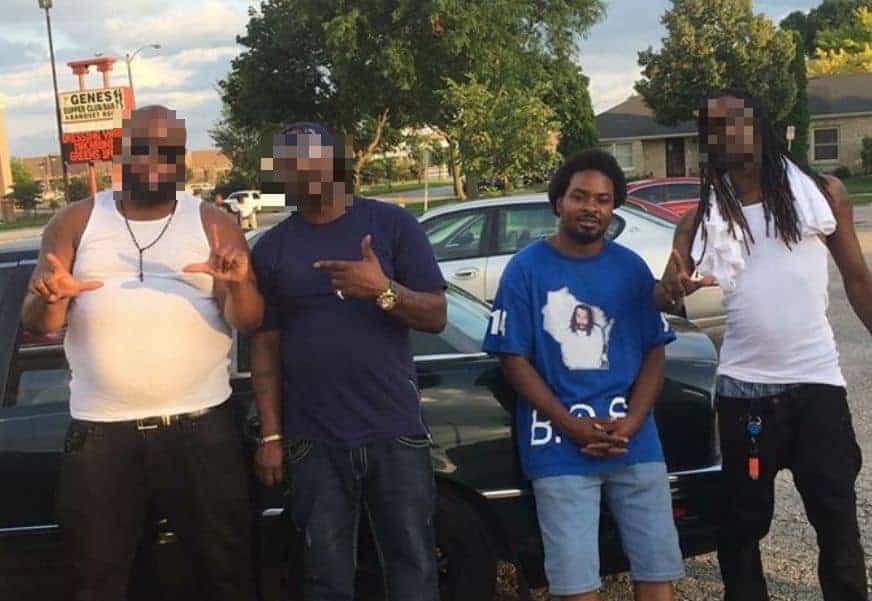
His G&D ties have gotten no ink in Milwaukee’s media. The Journal Sentinel story exulted Coleman as the Phil Jackson to BLM leader Frank Nitty’s Michael Jordan, referring to the Chicago Bulls’ storied basketball dynasty. Coleman is “the key organizer of the largest local daily demonstrations that erupted after the death of George Floyd in Minneapolis. Coleman directs medics, security and traffic control and makes sure a certain order holds,” the JS wrote. Coleman is sometimes overshadowed by the flashier Nitty. Don’t underestimate his influence.
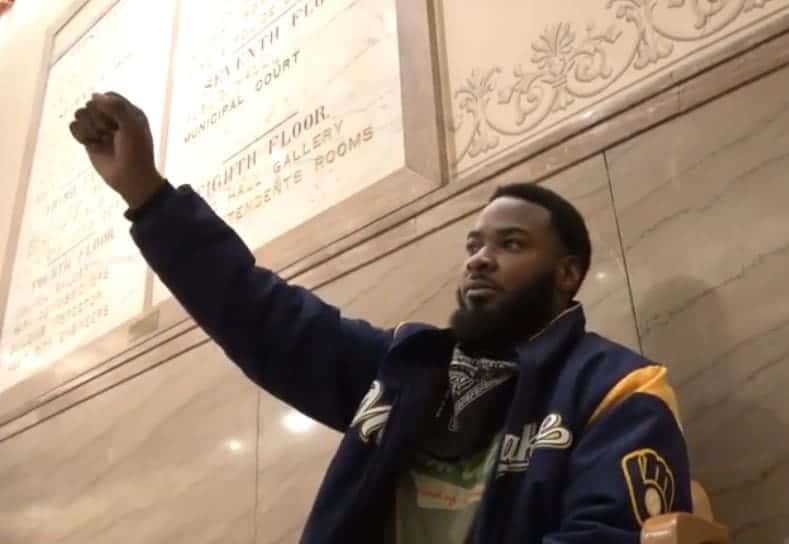
“Khalil Coleman started the movement and it goes unnoticed because he moves silent,” a woman gushed recently on Coleman’s wall. Another man wrote, “I need to be in Wisconsin with my G Khalil Coleman fighting a worthy cause…definitely a soldier at heart.” G means “gangster.”
Coleman is extremely open on Facebook about this. He uses the organization’s lingo (“PML,” “Folks,” “NTML”, etc.) routinely (he says the former means plenty much love), wears the organization’s six-pointed star, meets with its co-founders and OGs (original gangsters), wears its colors, and expresses admiration for its charismatic, legendary leader Larry Hoover, a convicted murderer who ran the GDs from a state prison cell and is now in federal supermax with El Chapo and the Unabomber. In one photo, Coleman’s shirt has Hoover’s face captured inside the Wisconsin state outline. His Facebook profile in July was Hoover’s picture inside a circle of the GDs’ six-pointed stars intermingled with the words “Black Lives Matter.”
“FREE LARRY HOOVER SR.,” he declared.
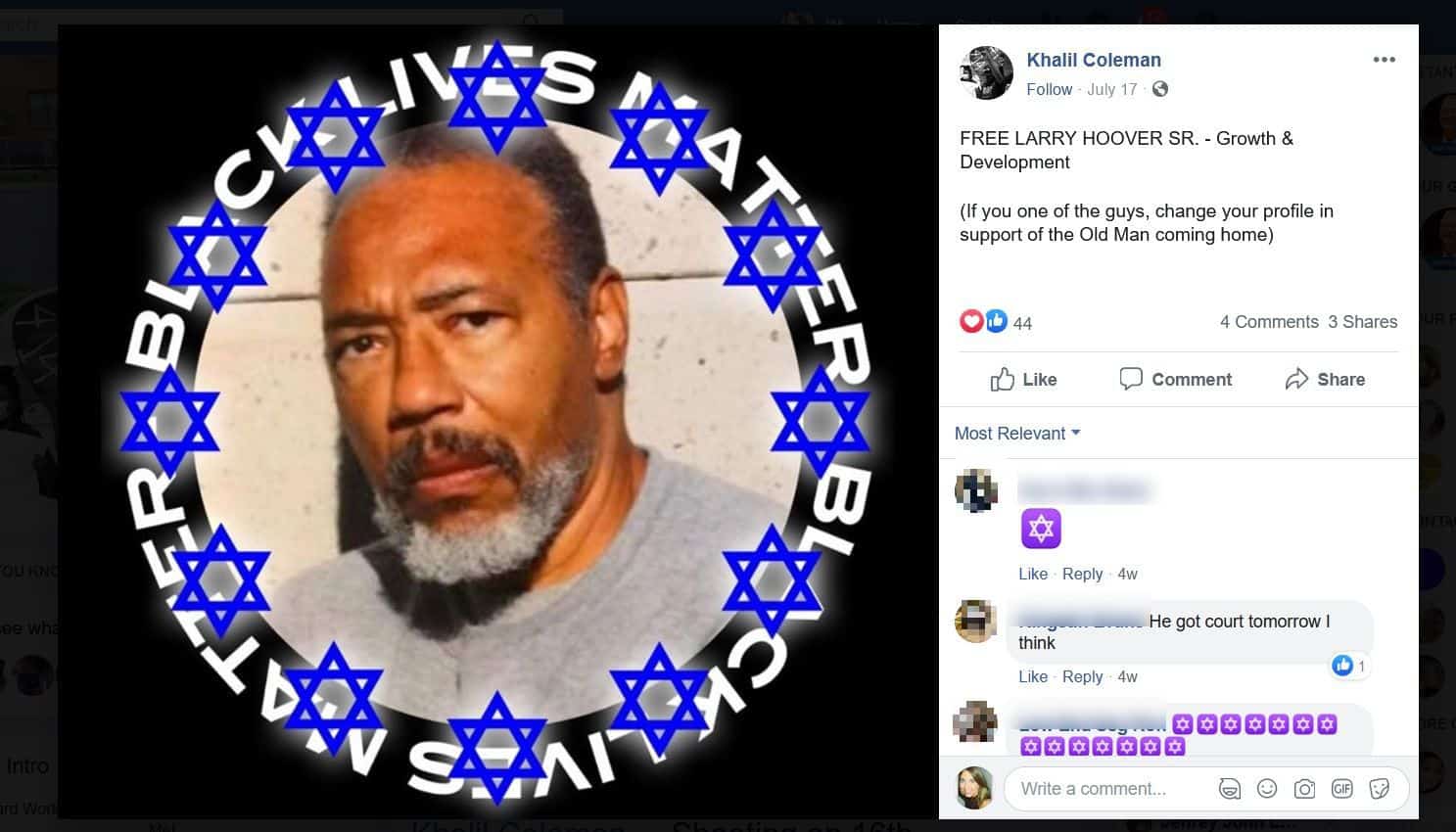
Coleman is a more complicated figure than that, though; he’s been described to us as a “soldier” who is a youth mentor, Safe Zone architect, author, holder of school contracts, and champion of community clean-ups. Milwaukee activist Tory Lowe said Coleman is “a soldier. He has a strong will. Very strong minded. He has a lot of heart. He’s helping a lot of young men.” He believes Coleman only engages in positive activities. Coleman seems respected by Milwaukee’s Black political leadership.
Coleman repeatedly insists that the GDs have taken on a new identity. They are “Growth and Development,” not the Gangster Disciples anymore, a benign philosophical rebirth focused on Black empowerment and positive issues like literacy and political engagement. He says he’s never been part of the Gangster Disciple identity. What is Growth and Development? Hoover created that too; the gang leader switched the Gangster Disciples’ name to Growth and Development in the 1980s, outlining his “Vision” for positive rebirth in a manifesto. Essentially, the kingpin argued his gang was now legit, a do-gooder community org that was helping empower Blacks. The manifesto encourages young Black men to engage in positive community activities. Coleman calls this version of G&D his “way of life.”
In this video, Coleman insists that Growth & Development is a positive, non-violent message for youth. Men flash “L” gang signs for Hoover. “That means cleaning up your neighborhood,” Coleman says.
The problem is that prosecutors and a jury didn’t buy Hoover’s sleight of hand.
“Hoover’s attorney claimed he actually was a political leader being persecuted by the feds. Jurors thought otherwise,” the Chicago Tribune wrote this August of “King Hoover’s” 1995 prosecution. Hoover has been in prison for a 1970s homicide but ran the gang from his state jail cell. The later prosecution put him in federal supermax prison.
Even then, wrote the Tribune, Hoover “tried to recast the Gangster Disciples as a reform group, Growth and Development, that supposedly could steer young people away from lives of crime…The evidence from Hoover’s conversations proved that Growth and Development was just a con job.”
Coleman’s affiliations extend into Hoover’s old-school inner circle. In July, just a few weeks before the ouster of Milwaukee’s police chief, Coleman met with a childhood friend of Hoover’s who was once described as the gang leader’s “righthand” man. The meeting went down in a Milwaukee tavern on the city’s north side. Coleman says they discussed the positive principles of Growth and Development.
The central challenge in deciphering all of this is that Growth and Development adherents also use the gang’s lingo, colors, symbols, initials, and they admire its chairman, Hoover. One community leader we spoke to indicated he’s seen Coleman with men in colors at marches and gets confused about how he’s supposed to tell: Are they Growth and Development or Gangster Disciples?
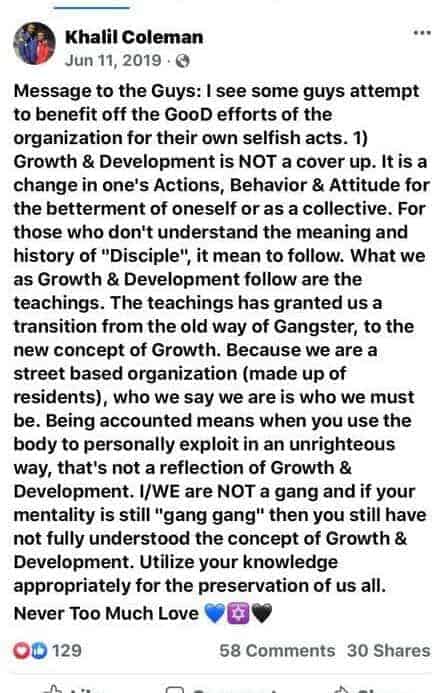
Coleman learned about Growth and Development from a Milwaukee teacher at Marshall High, when he was a teenager struggling to find identity almost 25 years after Hoover rebranded his gang. Coleman is the son of a hard-working mom and a father imprisoned for homicide, and he was searching for identity. The GDs were a powerful presence in a neighborhood without many role models in a city plagued by entrenched racial disparities (it’s been called the country’s worst city for Blacks to live). The teacher told him he couldn’t be in “Growth and Development” if he didn’t graduate. So he did.
Coleman thinks Hoover is a political prisoner and calls the gang leader the “Chairman” (Hoover ran the gang with Fortune 500 efficiency). He thinks the government brought drugs purposely to the Black community to destroy “street organizations” during the Civil Rights movement.
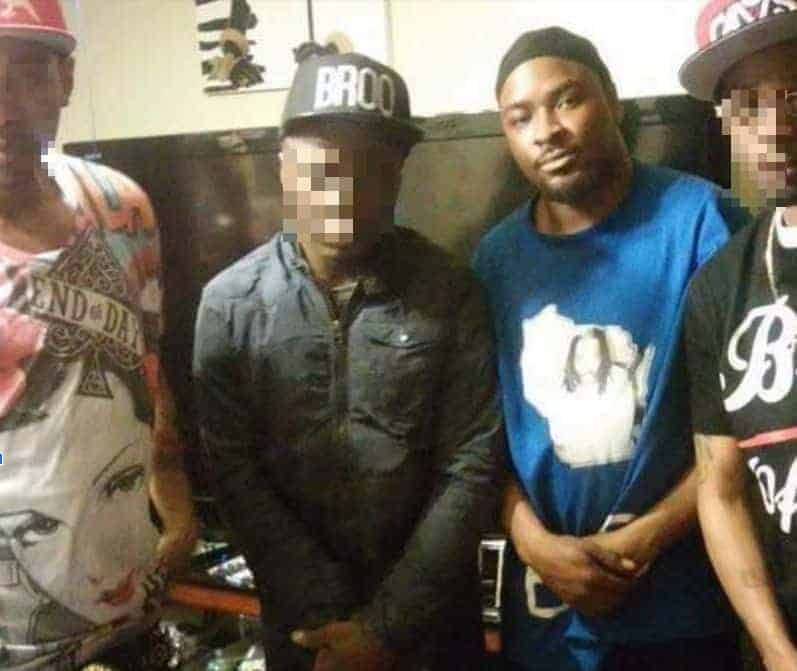
Coleman says the teacher’s message saved his life. He calls groups like the GDs, Vice Lords, and Crips “street organizations” known to the government “as gangs.” Such “street organizations” were originally founded as an “establishment of ownership in the community, community identity and the culture of blackness…” he says. The goal was “taking care of one another and protecting the community,” which was “still experiencing police brutality.”
“I love being a representative of Growth & Development Organization (G.D.) because it’s actually a way of life for me,” Coleman wrote on Facebook on Aug. 2. He says emphatically that he’s not involved in the group’s criminal activities. His rhetoric and the People’s Revolution’s policy goals do closely match some of Hoover’s teachings. In his manifesto, Hoover, sounding like a sage of the current prison reform movement, defined as enemies “anyone WHO supports or condones the ‘systematic warehousing’ and destruction of our people.”
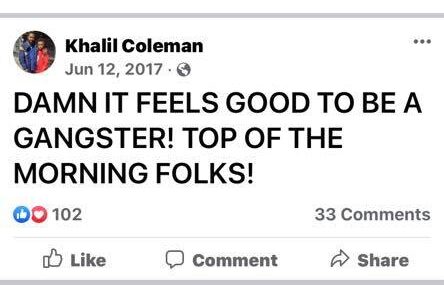
Coleman seems to be operating from the outside despite his political connections, hoping to effect policy change by pressuring politicians to cut police budgets and oust police chiefs. He condemns looting and arsons like those we saw in Kenosha. Some of his rhetoric is harsh, though, and some of the protests get ugly. “F*ck the system,” Coleman’s profile picture read recently. “Sometimes in life we have to pick a side.” He refers to police as “pigs” on his wall.
It’s possible to find recent federal indictments like one in Atlanta where Growth and Development was used as a criminal front. It’s possible to find prosecutors who say it was just a fake rebranding by Hoover to cover up a criminal enterprise, much like the Mafia with its garment shops and community involvement or El Chapo funding youth centers in Sinaloa. Is it possible, though, that someone – Coleman, but also others perhaps – could live out only the positive aspects of the gang leader’s later rhetoric – really live it out?
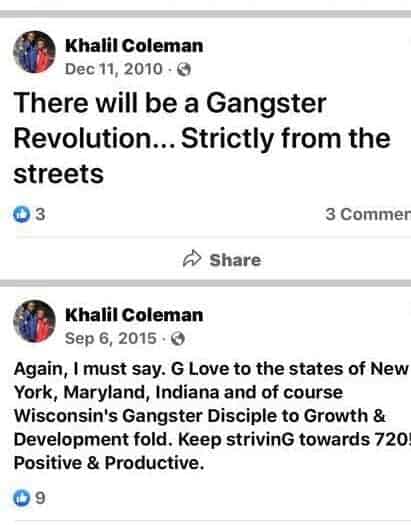
Coleman isn’t the only person claiming Growth and Development. You can find this rhetoric all over the country. Unfortunately, some people who use it also fill their Facebook pages with pictures of guns and burning police precincts (we found one such page in Minneapolis run by a former Milwaukee man with a felony drug conviction who has been photographed before with Coleman). We discovered organizations called “strength groups” all over the country that use Growth and Development rhetoric. They use positive language. But on some of their organizers’ pages you see things like this:

Coleman’s page focuses on marches. Whether the marches – say, those that have snarled up Wauwatosa for months – are positive depends on your perspective. They certainly weren’t positive the day a group went over to Wauwatosa Police Officer Joseph Mensah’s girlfriend’s house; one People’s Revolution protester, Ronald Bell, is accused of discharging a gun at the officer. He, too, had a Hoover/GD tribute on his Facebook wall. Coleman was there that day. He says what happened that day was a “mistake.”
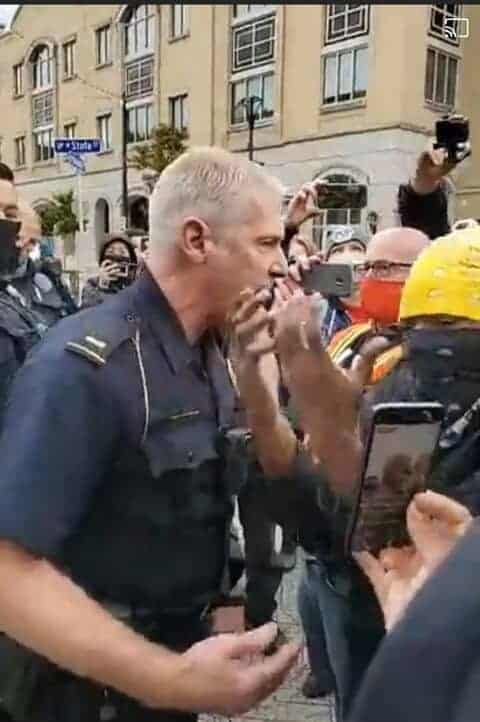
Protests in Wauwatosa have been ugly, with abusive comments shouted at police officers. “That’s the sh*t that gets a lieutenant smacked,” a woman said to an officer at one recent Wauwatosa protest that Coleman attended. People shouted “f*ck the police” and called the officers “p*ssies.” Coleman, who is in the yellow scarf in the video below, shouted, when officers gave the crowd three minutes to disburse, “Take them three minutes and shove them up your ass. Because we not going anywhere. Take those three minutes and shove them up your Chief’s ass.” That can be seen at the 2:00 mark.
Here is another video to give you the flavor of what is happening in Wauwatosa.
To prosecutors, the Gangster Disciples and Growth and Development are the same organization.
“Growth & Development was just a façade as an effort (by Hoover) to get parole,” insists Ron Safer, the lead Hoover prosecutor who put the gang leader away in federal prison in the 1990s. We spoke to him by telephone. “It was a total and complete fabrication.” Parole was denied. Safer compares Hoover to John Gotti and El Chapo but believes Hoover is “much brighter than John Gotti.”
Is it possible that someone could live out the principles of Growth & Development without continuing to participate in crime? Safer is skeptical. “Hoover was saying the same things, and he was a fake.” He conceded that someone could actually “live the cover story.”
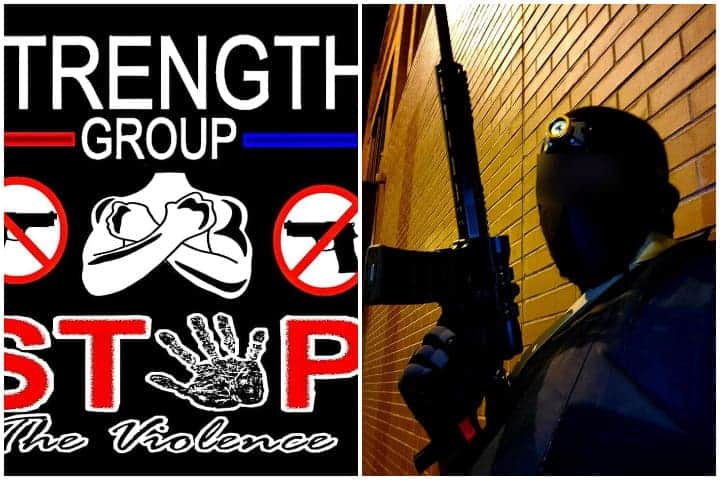
“If they buy the façade and live the facade, God love them,” Safer said. “But if they use the façade as Hoover did, then they belong in jail with him.”
Violence Spills Over After a Police Chief’s Ouster
Just a few weeks after meeting the Gangster Disciples’ co-founder, Ike Taylor, in a Milwaukee tavern, Coleman stood at the side of Milwaukee’s then Fire and Police Commission Chair Steven DeVougas and former Common Council president and Alderman Ashanti Hamilton. The crowd chanted for the firing of Alfonso Morales, a Mexican-American chief once declared a hero when he shot a gun-wielding gang member in a courtroom.
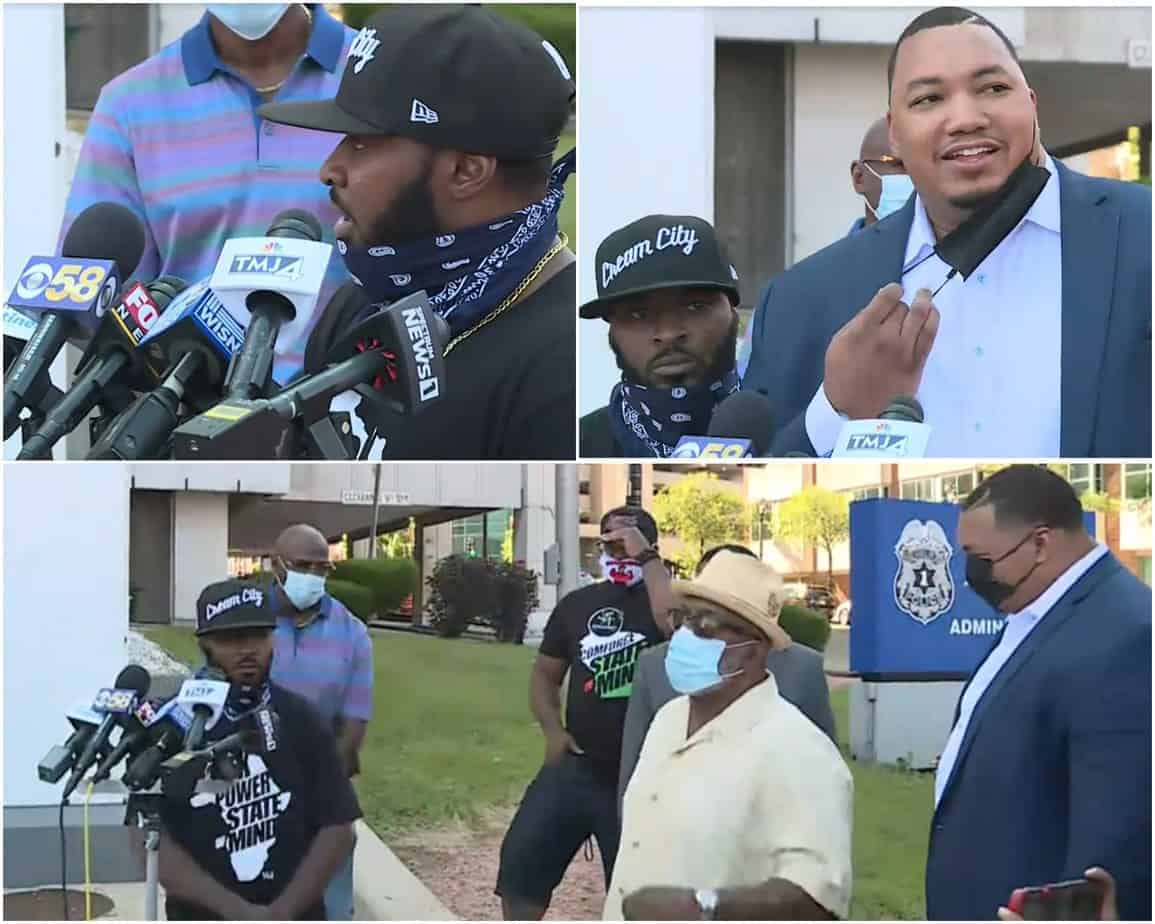
For months, Chief Morales was dogged by Black Lives Matter and other activists calling for his firing, and the civilian commission socked him with lengthy directives but now didn’t appear willing to let him try meeting them.
“I just received a call, VERY IMPORTANT, we need to be at MPD (Milwaukee Police Department) administration building…for a very important press conference, regarding FPC airing out the chief & mayor of Milwaukee for lack (sic) leadership,” Coleman wrote on Facebook on Aug. 6. “IT’S TIME! LONG LIVE THE REVOLUTION!”
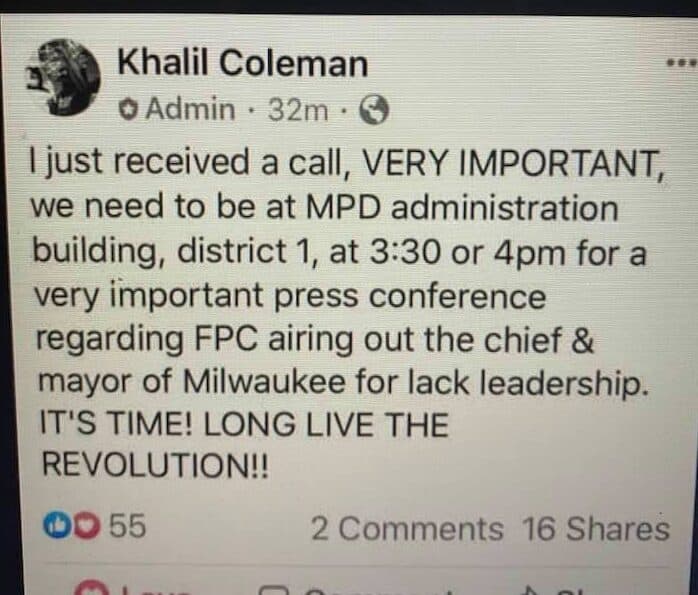
Coleman closed the event by telling the media, “I think the chair has made his statement.” A few hours later, the chief was demoted.
Coleman now says DeVougas called him “to stand with him as he’s making the announcement in regards to the chief.” Coleman says he has a long history with the commission because of past protests.
It wasn’t long after the chief’s demotion, though, that the protest movement turned violent.
Wauwatosa straddles Milwaukee and Waukesha counties, with their different philosophies and views of police, and Mayfair Mall has often been a magnet for diversity and conflict, a dividing line.
Violence boiled over, when 28-year-old Bell was accused of wielding a shotgun, which discharged at Mensah and his girlfriend. It was a chaotic scene with people running around the officer’s yard. Coleman was there. Mensah’s girlfriend posted photos of her bruises, Bell’s been charged with a felony; Mensah, who is Black, fatally shot three men on duty since 2015. All three shootings were ruled justified self-defense by the Milwaukee County DA.
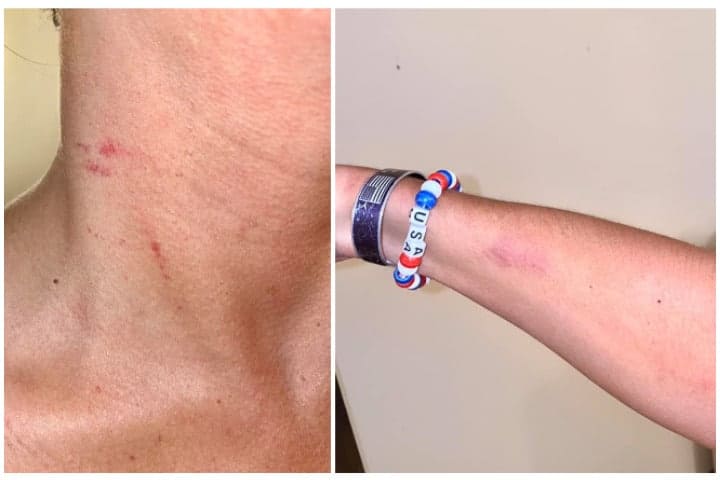
Photos on Bell’s Facebook page show what appear to be drugs and large wads of cash. In one comment, he referred to it as “dope boy money.”
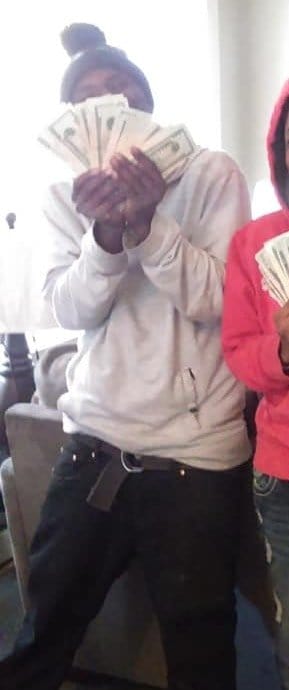
His appears in the list of signatories on the People’s Revolution letter to the Wauwatosa Fire and Police Commission from July that sought the chief’s firing and a reduced budget. Coleman admits Bell was “a protester.”
“I think he made a mistake,” Coleman says. “I wish things could have went a different way, I really do. It’s unfortunate. I feel bad about the situation. I never want to see people get hurt.” He said there was a lot of tension and partly blamed Mensah for “coming out of the house… We all could have done things different that day. I was present that day. Things happened so fast there were a lot of things I didn’t see.”
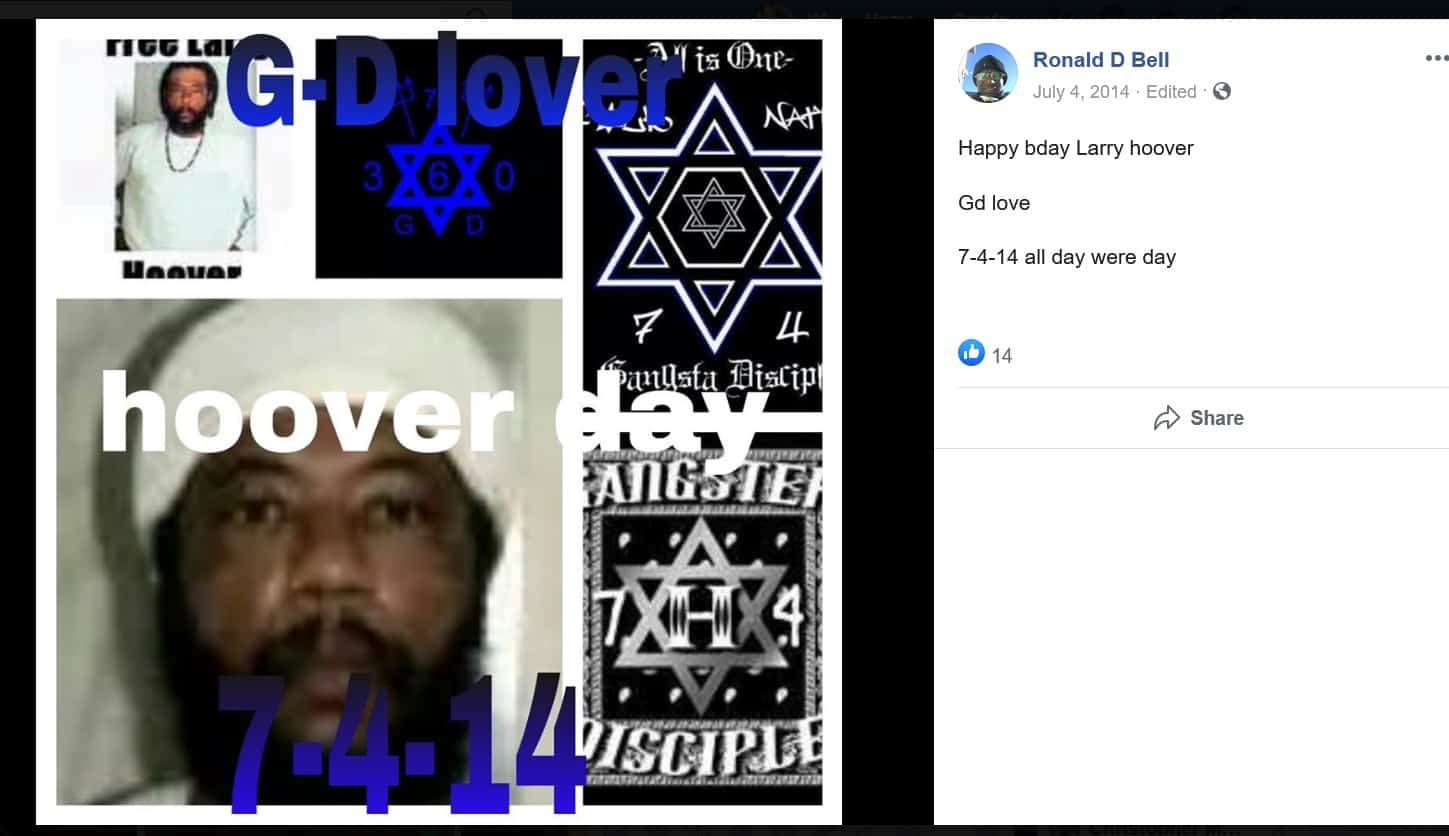
“I don’t know or recognize him to be Growth and Development,” Coleman insists, despite the Hoover tribute on the accused shooter’s page (see above).
“He can’t speak for other people,” Henry, the Baldwin staffer, interjects, cutting the line of questioning off.
We challenged Coleman on the fact that, in one of the shootings they’re protesting so adamantly in Wauwatosa, police say Alvin Cole, 17, had a gun and discharged it first in the Mayfair Mall parking lot. A review of Cole’s Facebook pages shows he went by the name “GlockBoy ManMan” on social media. Cole wrote things like, “Wake up in the morning I got murder on my mind !!”
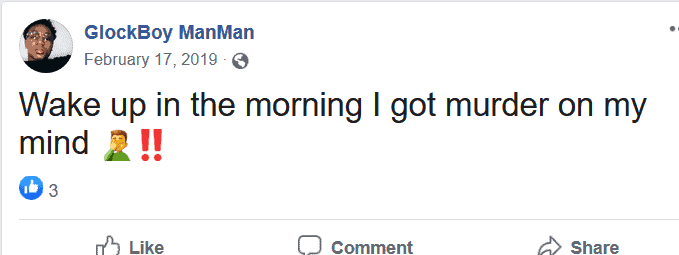
“Alvin Cole is dead. He don’t have a chance to tell his story. It’s the dead man vs. the cop. That’s the problem. That’s why we’re in Tosa,” Coleman says. His group wants a police body camera requirement, and a ban on chokeholds and no knock search warrants.
According to Coleman, the Cole family disputes the police narrative, is still seeking records, and no one has seen the ballistics.
“So, respectfully can we not get into anymore of this,” interjects Henry.
What does the People’s Revolution want? On Sept. 6, the group “released its demands.” Among them: “Defunding the Milwaukee Police Department” by slicing $100 million off the budgets of Milwaukee County law enforcement agencies. The group is demanding the resignation of Wauwatosa Police Chief Barry Weber and a “permanent hold” on “any increase in the budget to the Wauwatosa Police Department.”
We pressed Coleman: Why focus on the police? They come in on the back end. What about Milwaukee’s political leadership? Democratic Mayor Tom Barrett has been in office for nearly half of Coleman’s life. Coleman explained that it’s a racist system. We reminded him that the police chief, sheriff, city attorney, many aldermen, and the county executive are Black. He says they are just people in a racist system. He said they’ve protested at Barrett’s house as well. It’s hard to run candidates against Barrett because of finances, he says, claiming the city reduced polling places in the Black community when Lena Taylor, who is also Black, ran.
“When you look at the disparities and the issues Black people have been dealing with in Milwaukee, it hasn’t changed in 20 years,” he says. He’s right about those disparities. They are intolerable. Yet the protesters are focusing their ire on a former Mexican-American police chief and neighboring suburb’s Black cop. For that matter, who does a reduction in police strength benefit?
Coleman acknowledges that he wants to “defund the police.” He defines the approach as shifting money in the police budget toward crime prevention programs and social workers. Surprising us, he doesn’t support cutting or not filling officer positions (Barrett is reducing the force size by not filling 120 such positions). Could police reduction cause crime to increase? He doesn’t acknowledge the point.
We asked whether Coleman has considered how the protest movement – especially the way it’s turned into rioting – is causing harm to the Black community by driving out business. He commented that “people” are more important.
A Father’s Homicide Conviction & Escape
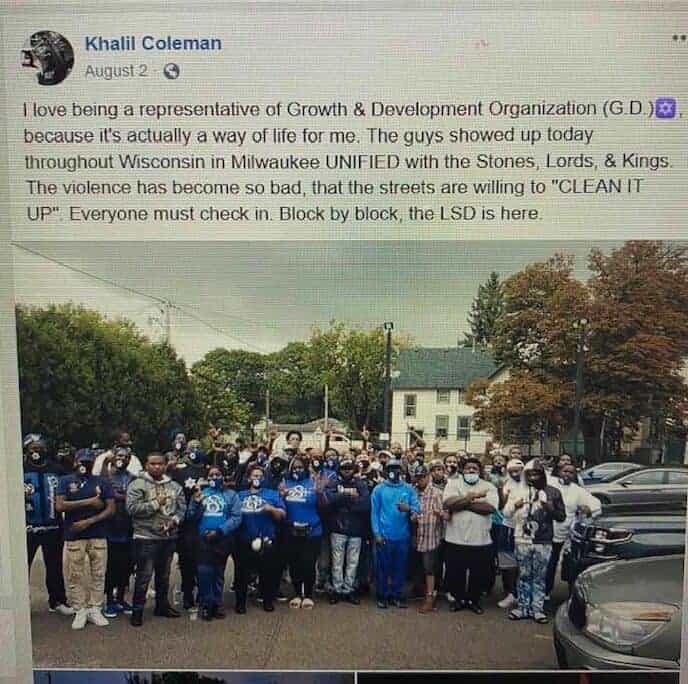 Coleman was born in Brooklyn but came to Milwaukee at age 1 with his mother, an order filler for JC Penneys who also worked at the Post Office. He went to six high schools. He described his mom as a “hard working independent woman” and positive influence. “My father was facing a life sentence when I came to Milwaukee. He was extradited to Wisconsin. That’s how we ended up here,” he says.
Coleman was born in Brooklyn but came to Milwaukee at age 1 with his mother, an order filler for JC Penneys who also worked at the Post Office. He went to six high schools. He described his mom as a “hard working independent woman” and positive influence. “My father was facing a life sentence when I came to Milwaukee. He was extradited to Wisconsin. That’s how we ended up here,” he says.
His father, Carl Estrada, who used the alias Lamont Coleman, was imprisoned for homicide and was a fugitive from justice for 11 years after escaping from a Waupun facility. Old newspaper articles show Estrada was sentenced to life in prison for the 1969 holdup slaying of Terry O’Keefe, a Vietnam veteran working as a Western Union clerk.
Another old newspaper article, written by Estrada in prison, described him as “acting inmate chairman of the Lifer’s Club,” designed “to coordinate self-help programs and other rehabilitative projects. Up until that time, lifers were a forgotten group of men.” Estrada escaped from Waupun in 1976. He earned a college degree in New York, “establishing a business and fathering six children by three women without being identified as a fugitive,” an old Associated Press article says.
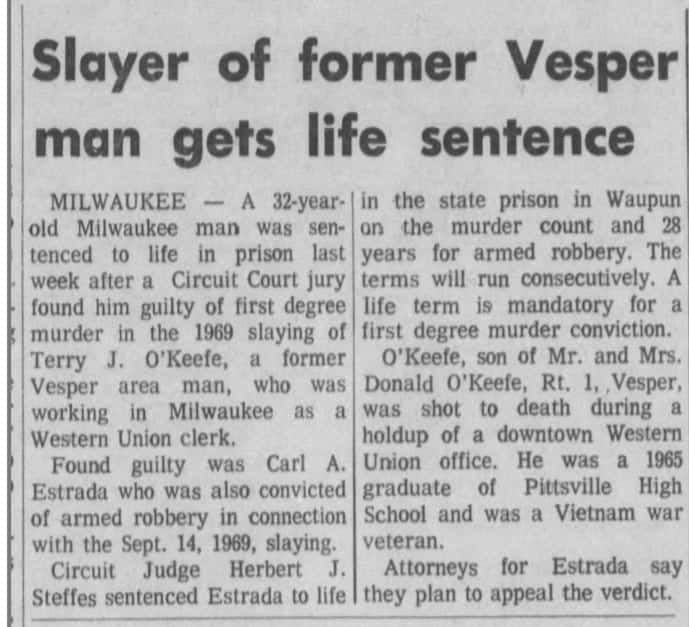
It’s not hard to see how prison reform and a powerful, imprisoned male figure like Hoover would resonate.
Coleman’s mom used to take him to visit his father in prison, but then stopped, so he didn’t see his father until the man was paroled in 2010. Estrada converted to Islam and died in 2015. Estrada once had a trucking business in New York selling bread, milk, and cheese and was a prison guard. How did this affect Coleman? “A lot of it caused me to look for identity,” he says. “That’s how I took on the identity of Growth and Development. Part of it was connecting to a cause.”
He lost about 10 friends to gun violence. He grows emotional as he describes the name of the first friend lost, David Robinson. “He was 15, and I was 15.” A lot of friends were in jail and prison. “I knew my life needed to be different,” he says. He started reading civil rights books.
“In 1982, the chairman, Larry Hoover, came up with a new concept…It evolved this old concept of Gangster Disciple mentality, of the Gangster Disciple Nation, and evolved it into the Growth and Development lifestyle of organization,” Coleman told us.
“Of course, a lot of people did not honor and follow that memo. A lot of people still to this day claim to be part of the Gangster Disciple Nation, but in the true teaching of GDs, that was all supposed to merge from Gangster Disciple lifestyle to Growth and Development lifestyle, which was about education, economics, political development, social development, organizational development, and unity.”
He insists: “It really changed my life…It means I’ve made a transition in my life from a negative way to a positive way.” As for Hoover, he’s “paying his price for things he’s done in the past…What he’s saying now is don’t be like me.”
Coleman believes “Gangster Disciple is a mentality. It’s an old way of thinking.”
Coleman, who protested the deaths of Dontre Hamilton and Derek Williams through Occupy the Hood, helped start a Safe Zone initiative that received government money. He said it reduced homicide and included outreach from “hood ambassadors.” He said he’s sold thousands of copies of a book he wrote about the inner city to several Wisconsin school districts, and that he’s been contracted to create peer mediation programs at Milwaukee’s Riverside High. “My classes revolve around literacy,” he says.
Coleman does have a criminal history dating to 2010. He says that was “dismissed,” but he was convicted of misdemeanor marijuana possession and bail jumping A woman said he often left a 40.caliber Glock handgun loaded “within the reach of their child,” according to the criminal complaint, which said authorities confiscated marijuana, the gun, knives, and two ski masks. The complaint alleged he violated a no contact order. He was allegedly found with a handgun in another case, a charge dismissed but read-in. He’s had no charges for a decade.
“Milwaukee is a very violent, segregated, and impoverished community,” he says. “Mass incarceration is major.” We challenged Coleman again on whether police are to blame (or are they just the most visible target?) He puts the blame on “City leadership. You don’t see that in Shorewood and Whitefish Bay, and these are blocks away from each other. We’re not talking across the ocean. What makes my community different than theirs?”
Sen. Lena Taylor told The Washington Post that Coleman and others “have been doing all kinds of community work — gun violence interruption, helping people with evictions.”
Coleman was pictured with County Executive David Crowley in March. Taylor wrote, “You make us all proud and provide so much hope to the young people you touch daily!” A 2019 photo shows him with U.S. Rep. Gwen Moore’s son, S. Moore Omokunde. “The guys of Growth & Development with legendary Dr. Howard Fuller!” Coleman wrote in a photo with former MPS Superintendent Fuller. He called former state Rep. Jason Fields his mentor, receiving this response, “Love you lil bro! Proud of you on so many levels!”
He’s been photographed with former Common Council president Ashanti Hamilton. He’s shared photos of a City Hall youth summit, Black tuxedo event, and city violence prevention meeting. Taylor, Hamilton, and Fields did not return requests for comment.
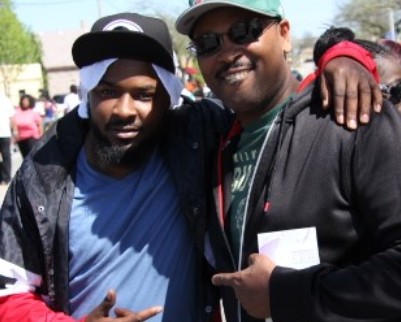
“G & D (Growth and Development) is more than one thing,” agrees University of Illinois Professor John Hagedorn.
“It reflects the belief of gang members that they are doing something worthwhile. At the same time the drug dealing and violence continue. I had Larry Hoover Jr. speak in my class at UIC, and he ran the G & D (Growth & Development) is what the GDs are all about and wouldn’t talk about drugs. He claimed GDs try to stop the violence. My class saw through him…There are multiple ties between GD leaders and Chicago’s Outfit, the local mafia.…The ideology of G & D (Growth and Development) is positive, however those ideas have a long history in Chicago of covering up for organized crime dating back to Al Capone. G & D is also a rationale to release Larry Hoover on parole. Not happening.”
Safer suggests: “It’s not what you say; it’s what you do. If you are then picking up a gun, you are a gangster. If you’re picking up a book, then you are building our future.”
Hagedorn and Safer think disparities fuel gangs. “You see these kids selling drugs, you see people lined up to buy drugs from them, and you see nothing else,” Safer says. “There’s no drug store, there’s no grocery store, there’s no dry cleaners, there’s no bank, there’s nothing…There are no alternatives.” What about education, hard work? There are “very few role models” for that.
A ‘Brilliant, Charismatic’ Leader
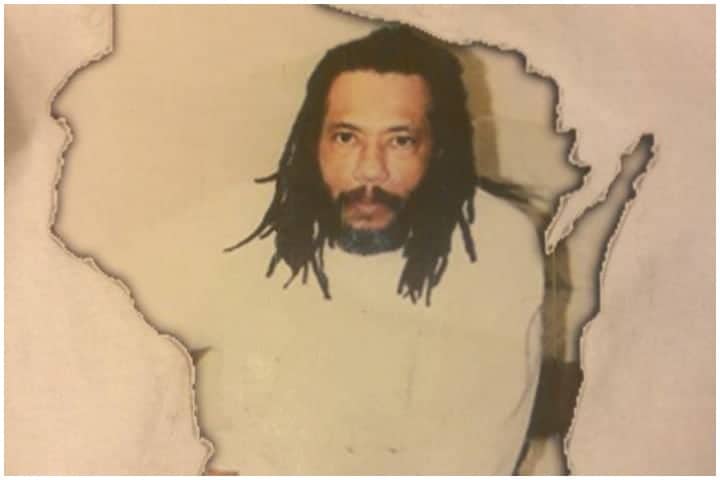
Hoover’s sleight of hand complicates the Growth and Development story. Safer says the government had Hoover on weeks of tape running a criminal enterprise after he claimed the gang was now Growth and Development. The youth of Chicago took the bullets on the street corners.
Coleman says he doesn’t know about that, but the inner city has flawed heroes by necessity. “In my community, many times we don’t have doctors and lawyers…so anyone willing to change your life in a positive direction is okay,” he said, stressing that he is “not applauding any doping and murder.” It’s important if an individual can say: “Don’t be like me.”
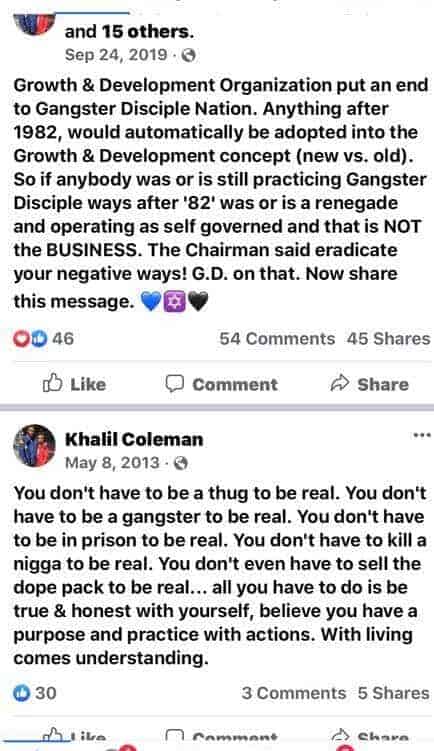
Hoover, 69, penned his 45-page manifesto called “Blueprint of a New Concept” that preached literacy, business development, prison reform, and political engagement. Growth and Development. It’s a bit like adopting Don Corleone’s positive manifesto and claiming it’s not the mob.
The rhetoric of Black Lives Matter, People’s Revolution, and Coleman closely matches the gang’s interests when it comes to inmate releases and policing reform. “The Gangster Disciples are by far the most populous gang in the prison system,” says Safer, who thinks a true community activist should discard Hoover’s terminology.
“Larry Hoover, I truly believe that when he developed the understanding, the concept of Growth and Development, that he wanted those younger people coming up the pipeline to not follow the path of before,” says Coleman.
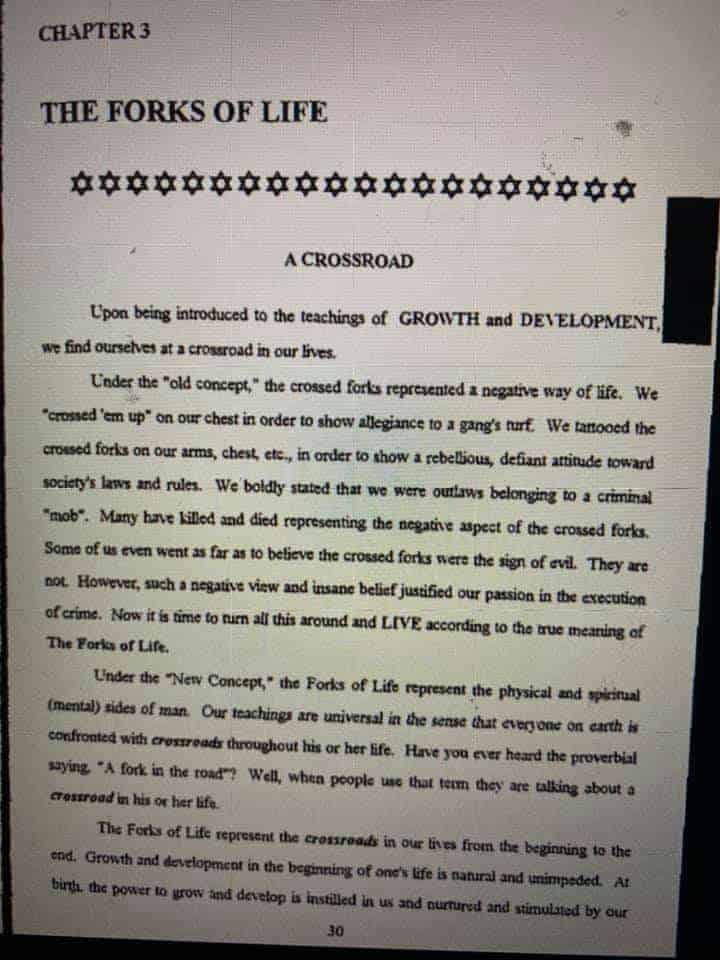
“You don’t make some noise, then nothing’s gonna change,” Hoover told The Chicago Reader publication in 1995. “…You need to have a movement, because you don’t have a black movement nowadays. They [young people] have nothing to point to. They have no Martin Luther Kings or Malcolm Xs.” Instead, they revere Hoover. And now they have Black Lives Matter.
George Floyd’s death in Minneapolis changed things. Suddenly, inmate releases and the abolishing of police departments seemed possible. The “Chairman of the Board” is seeking resentencing under a 2018 prison reform law signed by President Donald Trump at the urging of Chicago-raised Kanye West and his wife. The media made likable Alice Johnson the poster child; West brought Hoover’s lawyer into the Oval Office. Several of Hoover’s lieutenants have already been released. “Larry Hoover is an example of a man that was trying to turn his life around,” West said, calling for Hoover’s freedom.
Shoutout to my boy Attorney Justin Moore, who was invited by Kanye to be in the White House to advocate for his client, Larry Hoover. His facial expressions represent all of our faces right now. pic.twitter.com/1sRmd8Nt9k
— A.T. The Dallas Nightlife Ambassador (@OhThatsAT) October 11, 2018
“This is a great first step,” Larry Hoover Jr. wrote on Facebook in 2018 of the prison reform law, which allows federal inmates with crack cocaine convictions to seek early release.
https://www.youtube.com/watch?v=GqiF6Zpo3ks
Safer described Hoover as “brilliant, charismatic, tremendously organized, and amoral, violent, greedy and really a traitor to the (Growth & Development) cause that he articulated.” He says the Gangster Disciples were “the largest monolithic gang that our nation has ever known. And everyone reported to one person, Larry Hoover.”
Hoover modeled his criminal enterprise on Al Capone’s and Mayor Daley’s. Safer says GDs committed thousands of murders across the country. “Part of that campaign (by Hoover) for parole was to say, ‘Look, I have transformed the GDs into Growth and Development,’” Safer said in an interview.
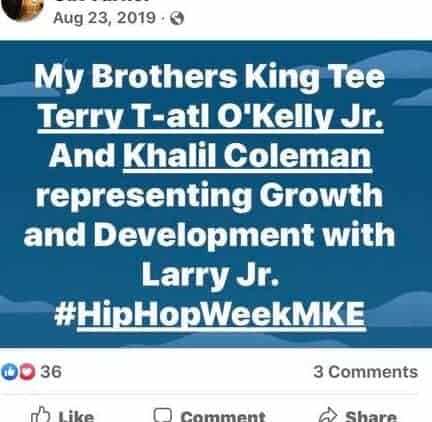
“‘Now we have board members who are running this organization, and it’s just like any other organization. We’re for health care, registering for elections.’ They had a public interest group called 21st Century VOTE. They organized demonstrations. Some of the community activism, you would say, yes, that’s legitimate.”
Safer contended: “Unfortunately, it was largely a façade for his continued drug operation. He (Hoover) is a charismatic leader who could have run a community organization for good, but he chose not to. He chose instead to run a ruthless, drug operation, and he is on tape talking about the corruption of the youth of Chicago….That’s the Growth and Development plan for the city of Chicago. It was to create this army of people who would sell his drugs…nothing more, nothing less.”
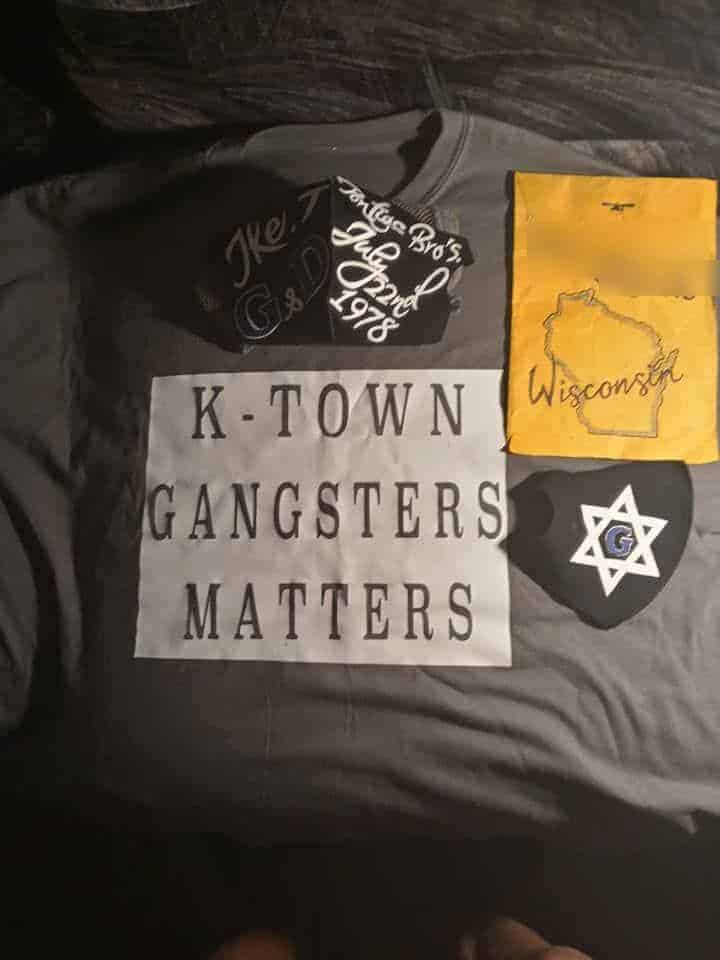
Hagedorn says it’s important “to understand that gangs are not one thing.” Hagedorn adds:
It is normal to believe both G&D (Growth and Development) ideology and go out and sell drugs and maybe shoot at a rival. This struggle within gangs is literally life and death and it has always been going on. Gang members…are not unfeeling monsters, but real live human beings with complex emotions. As Black people they love their community and race. The old leaders haven’t fully grasped the lessons of the 1990s when battles over drug markets took thousands of lives in Chicago.
According to the professor, “some GDs came to Milwaukee with their families trying to get away from the violence in Chicago in the 70s. As gangs formed here…the kids ‘took sides’ and lined up with the image of Chicago gangs. But some major Chicago gang figures also migrated. One of the guys I worked with the closest married Larry Hoover’s sister who lived here… Chicago gang members brought with them the literature, and the kids gobbled it up.”
The most violent years in Milwaukee, until this year, were driven partly by “a GD spin-off the BOS (Brothers of the Struggle),” Hagedorn says. After Safer’s indictments, the gang fractured. He says gangs today are often neighborhood crews that align with rappers.
An Original Gangster Comes to Milwaukee
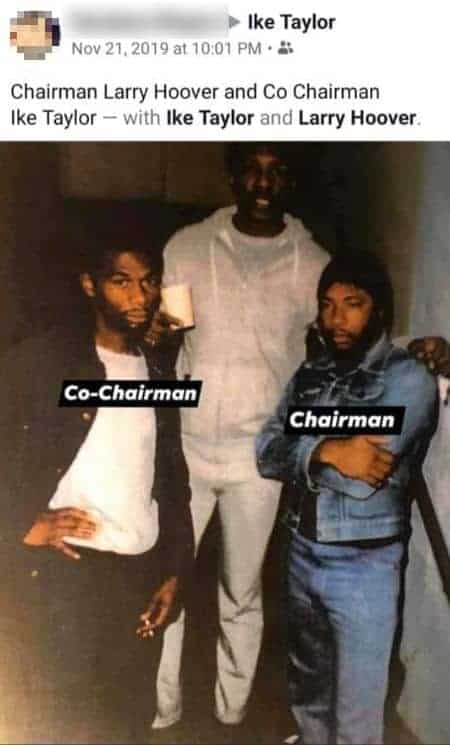
Ike Taylor, an OG (original gangster) who met with Coleman at the North 20th Street Milwaukee tap in July, grew up with Hoover. As far back as 1964, Taylor, a founder of the Supreme Gangsters gang that merged into the Gangster Disciples, was described as Hoover’s “right hand man.”
Taylor stands in the middle of the picture below. Coleman, wearing a mask with the Gangster Disciples symbol, stands on Taylor’s left. “P.M.L. my G!” Coleman wrote.
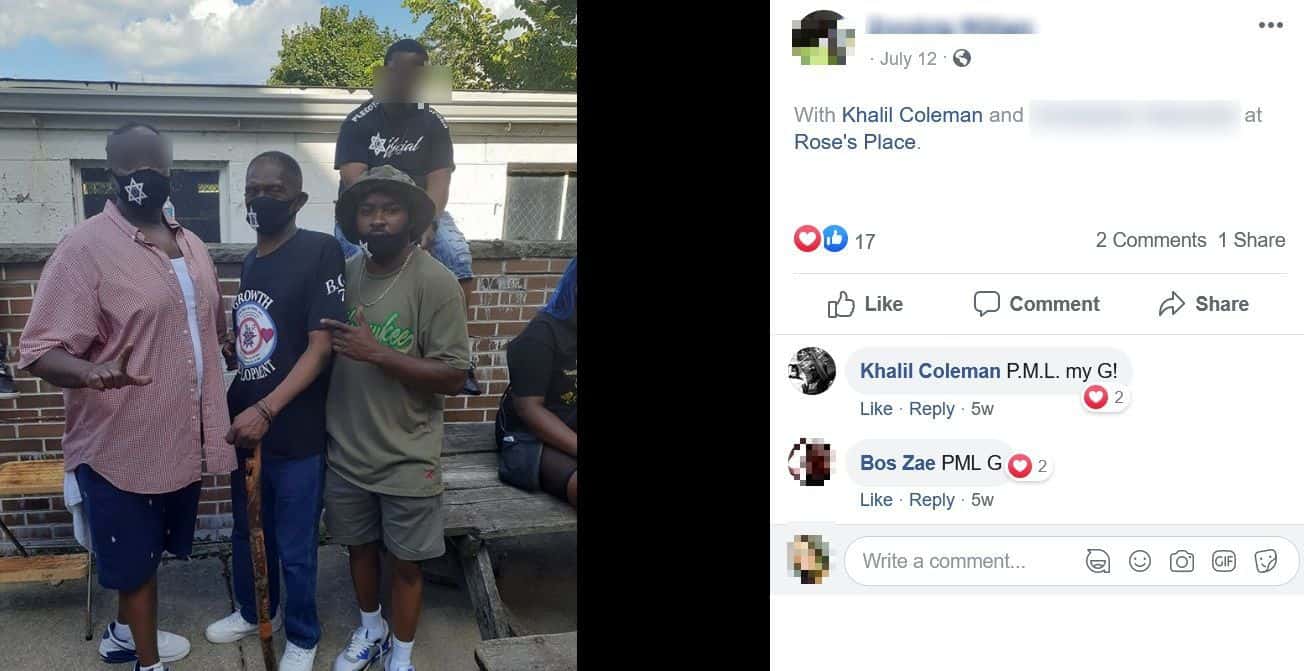
A post shared on Taylor’s Facebook page refers to Taylor as the “co-founder of Growth and Development.” On Facebook, Taylor, who did not return request for comment, wrote recently, “Larry is not the leader or Chairman of, BGDN (Black Gangster Disciples Nation). Larry is the former and retired Chairman of Growth and Development. A thousand times Larry was asked if he wanted to leave the penitentiary. I know because I asked him at least 500 times.”
The Free Larry Hoover Facebook page explains how Taylor shared a jail cell with Hoover in the 1970s. “They would remain BGDN (Black Gangster Disciple Nation) at their Core forever.”
On July 10, Taylor wrote that he was heading north:
Okay You Cheeseheads. Da Bears in your State. I will be stopping in Kenosha and Racine Tonight. (Another Milwaukee man) and Khalil Coleman, I will be at our Pre-Arranged Destination. 3 p.m. sharp…Am Definitely Looking Forward to Seeing And Being With My Brothers and Sisters of the Struggle in Milwaukee Tomorrow…Plenty Much Love.” Brothers of the Struggle is a common reference of the GDs.
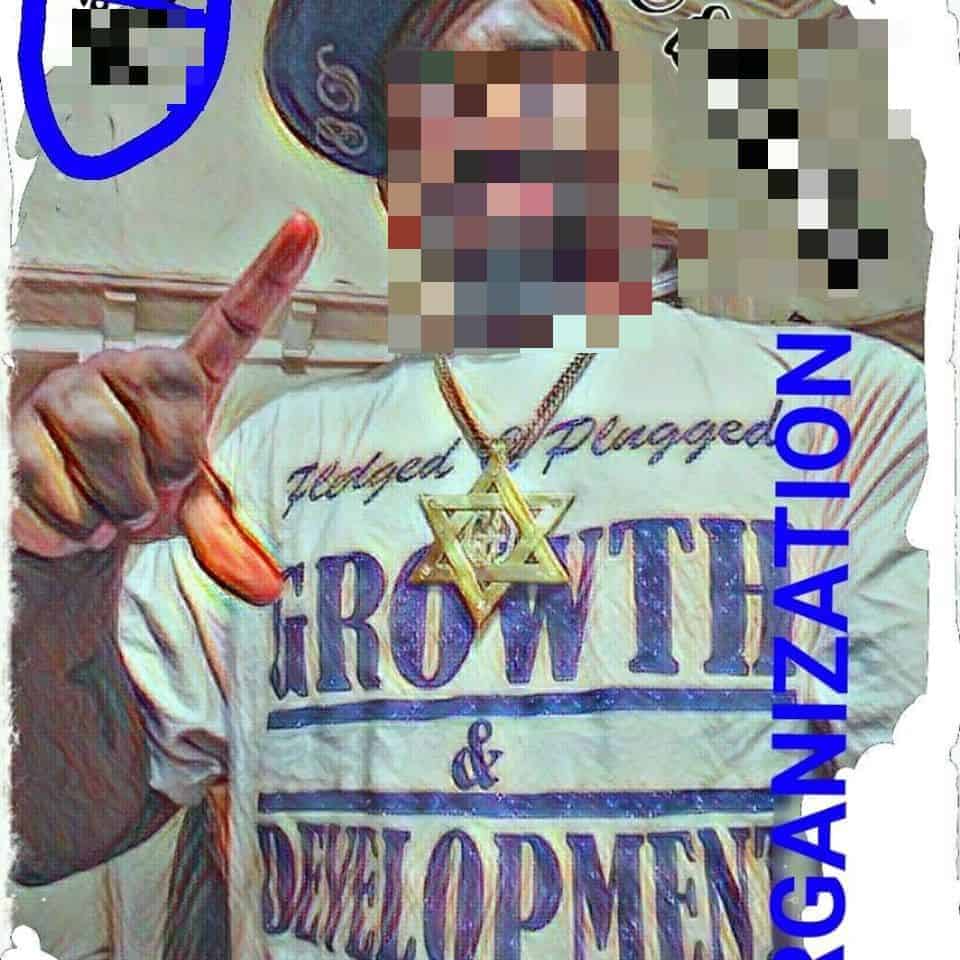
Taylor wrote about the meeting later on Facebook.
Thanks to all my Brothers and Sisters of the Struggle…it truly was an honor to meet and greet you all. Thanks for making the Vision a Reality. Thanks for being One of the Willing.
I really do appreciate my personal and Milwaukee’s security team…Milwaukee is so G&D…The love and respect for the Chairman, me and G&D was so obvious, evident and on display.
“The struggle is truly alive in Wisconsin,” declared a Milwaukee man. “Free Hoover,” commented another.
“We had the opportunity to officially meet Ike Taylor,” Coleman explains. “He was one of the original founders of BGD (Black Gangster Disciples) at the time, and one of the things he shared with us was how proud he was of the concept of Growth and Development. He too is a believer in the concept of Growth and Development.” He says protests never came up.
Taylor was part of the Pontiac inmates accused of staging a prison riot in the 1970s that left three guards dead. They were charged but acquitted. On a shirt he posted, Taylor is called “Ike ‘King Ike’ Taylor (High Supreme Gangster/Black Gangster Disciple Nation)… he started Gangster Disciple on the West Side of Chicago.”

“It’s time for you Brothers in your 30’s and 40’s to pull up your pants…Try being a respectful gentleman gangster for a minute or two. I promise, you will go so much farther in life,” Taylor wrote on Facebook recently.
Taylor is described on Facebook as “DEAR GRAND ELDER AND CO-CHAIRMAN IKE-T.”
Taylor is a convicted attempted murderer. “In the early 1970s Ike Taylor was convicted of attempted murder and other charges after the shooting of Albert Harris,” says Chicago Gang History. “In the court case of People vs. Taylor on December 24, 1974, Albert Harris was walking home from a friend’s house and was down the street from where he lived. Harris stopped walking when he heard the clicking sound of a gun, he turned and claimed he saw Ike Taylor standing there holding a pistol. Harris said that Ike said, ‘It ain’t nothing but a Gangster Thing.'”
He protests his innocence. However, the article adds, “In later years Ike Taylor would become a positive leader and positive advocate for the Growth and Development concepts of the Gangster Disciples.”
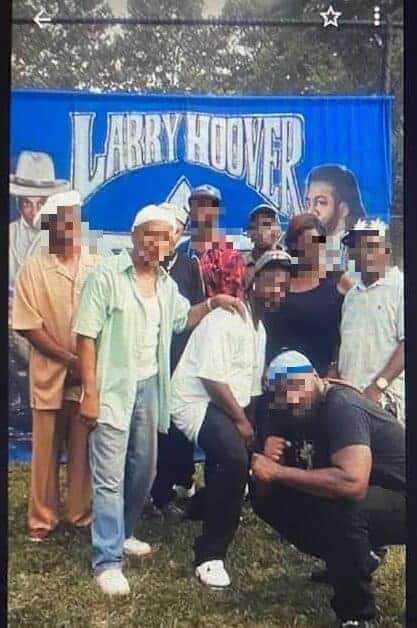
In March, Coleman was photographed in what was described as “organizational Sunday” for visitors from Arizona. “…AZ is on a rise of Growth And Developement (sic),” a man wrote, using gang symbols.
In February, Coleman was in Chicago with Taylor at the funeral of a man called “Gov.,” Duffie Clark. Governor is a high-ranking title in the GDs. Clark was paroled after serving 34 years in prison on murder convictions he says weren’t fair. Coleman says Duffie Clark was a positive mentor “to a lot of younger guys.”
Hagedorn was “friends with Duffie Clark who was Hoover’s cell mate while the Blueprint of Growth & Development was being written. Duffie works as a para legal and has made a major contribution to reentry… He spouts the G &D Line… I’m sure he holds some prestigious title and communicates regularly with Larry, for what’s that worth.”
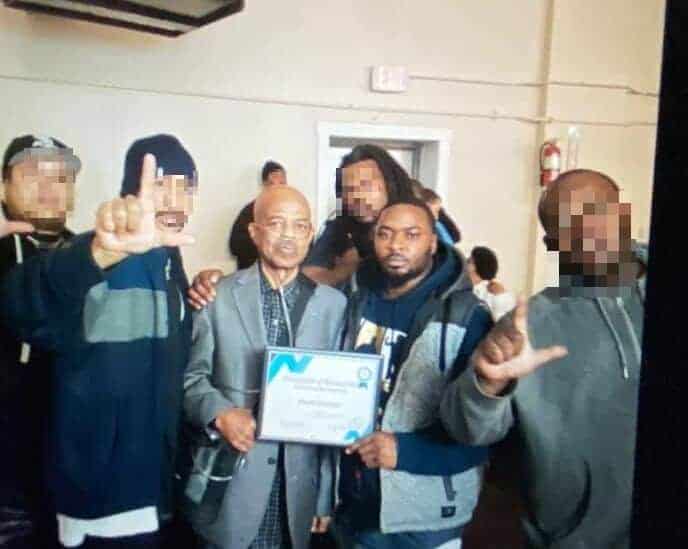 A photo shows Clark giving Coleman an award for “outstanding service,” next to a man flashing an ‘L” sign for Larry Hoover.
A photo shows Clark giving Coleman an award for “outstanding service,” next to a man flashing an ‘L” sign for Larry Hoover.
“You (Clark) will forever be a legend and push to continue on with Growth and Development! Thank you,” Coleman wrote. “It was an honor and privilege to have you as a leader.”
Disclosure: Jessica McBride is the niece of Wauwatosa Mayor Dennis McBride.
Table of Contents
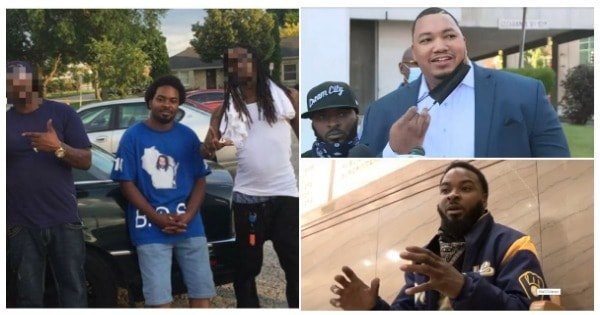


![WATCH: Elon Musk Town Hall Rally in Green Bay [FULL Video]](https://www.wisconsinrightnow.com/wp-content/uploads/2022/04/Elon_Musk_3018710552-265x198.jpg)
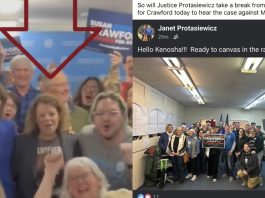
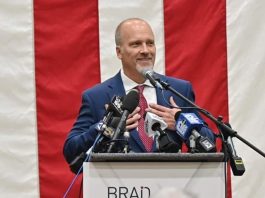
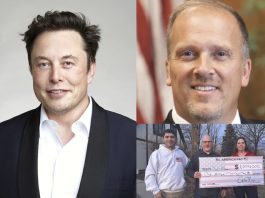
![The Great American Company [Up Against the Wall]](https://www.wisconsinrightnow.com/wp-content/uploads/2025/03/MixCollage-29-Mar-2025-09-08-PM-4504-265x198.jpg)
![The Wisconsin DOJ’s ‘Unlawful’ Lawman [WRN Voices] josh kaul](https://www.wisconsinrightnow.com/wp-content/uploads/2025/03/MixCollage-29-Mar-2025-08-48-PM-2468-265x198.jpg)



![Judges vs. Trump [Up Against the Wall] Frederick Walls Trump Holds Cash Special Counsel Jack Smith Iowa Victory for Trump Remove Trump From Primary Ballot](https://www.wisconsinrightnow.com/wp-content/uploads/2023/11/trump-case-dismissed-265x198.jpg)
![The Fed Reverses Course [Up Against the Wall] the fed](https://www.wisconsinrightnow.com/wp-content/uploads/2023/07/Collage-Maker-20-Jul-2023-08-12-AM-729-265x198.jpg)